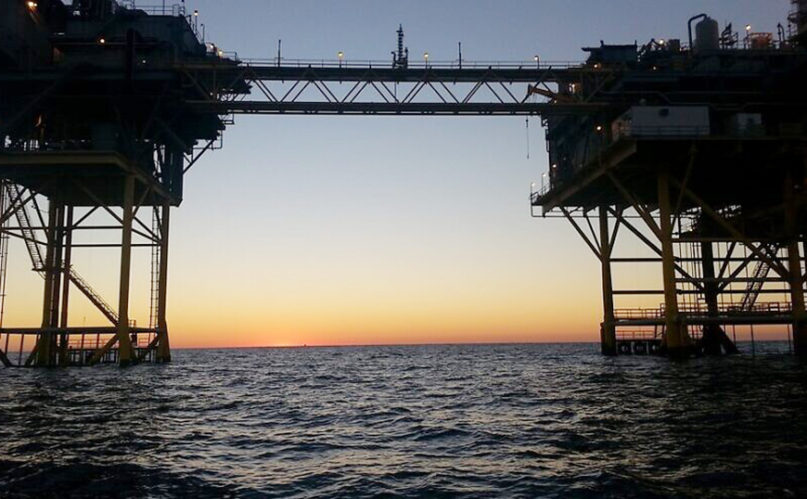
By Alex Traiman
(JNS) The start of natural-gas flow from the Leviathan rig is a momentous achievement for the State of Israel.
For the first time, a resource-poor country can become an energy superpower. The export of natural gas to immediate neighbors Jordan and Egypt—and later exported via Cyprus and Greece—strengthens Israel’s geopolitical status both in the Middle East as well as the West.
In addition to formal peace alliances and security cooperation, Jordan and Egypt are turning to Israel to provide for their energy needs. In the past, Egypt exported gas to Israel. Israel already supplies Jordan with water. The cooperation is likely to lead further towards normalized ties with other Sunni Gulf states.
Natural-gas flow via a pipeline shared by Cyprus, Greece and Italy will link Israel more closely with Europe. An aggressive pipeline project to Italy would be among the deepest and longest underwater pipeline projects ever completed.
Obviously, the most important benefits of the gas flow will be felt at home. Together with Israel’s ability to desalinate water, the country now has the ability to keep the lights on and water flowing well into the future.
Exports will generate tens of billions of dollars in tax revenues for the Israeli government. Additional funds can be used for infrastructure, health care, education and defense, and may even ease the tax burden on Israeli citizens. In addition, natural gas will completely replace coal as an Israeli energy source, which is expected to significantly lower air pollution.
In the time since gas at Leviathan was initially discovered, Israel has emerged into a regional defense superpower and a technical superpower that now boasts a top 10 global economy. Israel has also emerged from diplomatic isolation having productive trade relations with major global powers, including the United States, in Western Europe, China, India, Russia, and in the new frontiers of Africa, South America, Eastern Europe and Australia.
Israel’s military strength has grown significantly, too. Israel has developed an immense qualitative edge over its enemies, including two new squadrons of F-35s; precision-guided missiles; advanced missile defense, including the Iron Dome, Arrow, David’s Sling and Patriot systems; naval destroyers; submarines—all in addition to some of the world’s most powerful weaponry.
The sharp economic growth, improved worldwide diplomatic relations and aggressive defense spending have been pillars of the Netanyahu doctrine. And yet, the deals signed to exploit and export natural gas will likely be considered among his crowning achievements.
The most important benefits will be felt at home.
At the time, the prime minister’s opponents wanted the natural-gas reserves to be fully nationalized. And while there is understandable motivation for preventing the exports of the reserves and ensuring that Israel will have energy for the next century, in reality, Israel did not have the short-term economic capacity to finance the exploration project. Similarly, it did not have the professional expertise necessary for exploiting underwater natural gas without the help of multinational energy companies.
By signing commercial deals with Noble Energy, Israel found both the financing and expertise to quickly exploit and begin the flow of natural gas. Export contracts with Jordan and Egypt provided the necessary securities. Without the promise of export income, the project’s financiers would have no way to recoup their expenditures within a reasonable time frame. In other words, the export contracts were needed for Noble and other backers to enter the deal.
Signing the deals was not simple for Netanyahu and fulfilling them has similarly proved complicated. Israel’s Supreme Court intervened in determining the market value of natural gas among other regulations. In a definitive example of Israel’s overreaching judicial activism, in 2016, as drilling was taking place, the Supreme Court forced the government to renege on contracts it signed, which had essentially locked government regulations in place for a 10-year period—a requirement demanded by Noble.
At the time, Netanyahu told the court, “We have undermined the energy companies’ confidence in us, as well as that of the international banks that are supposed to finance the investments and that of countries who are supposed to be customers for Israeli gas.”
He then successfully set out to restore faith and renegotiated the contracts, in spite of the difficulties caused by the court’s overreach. The prime minister’s current job security similarly now hinges on rulings related to charges never before leveled on any politician.
As Netanyahu battles for his political career, the start of natural-gas flow from Leviathan is an important validation of his successful tenure as prime minister before what Israelis hope will be a decisive third national election on March 2 in less than a year.
And while Leviathan is the second-largest reserve found in the Mediterranean to date, it’s extremely likely that significant additional quantities of natural gas are present in Israeli territorial waters.
Whether or not Netanyahu will be the prime minister who signs future contracts remains unknown, but the accomplishment reached this week will benefit Israel and stand in the name of the country’s longest-serving prime minister for decades to come.
Alex Traiman is the managing director and Jerusalem bureau chief of Jewish News Syndicate.








 Southern New England Jewish Ledger
Southern New England Jewish Ledger










